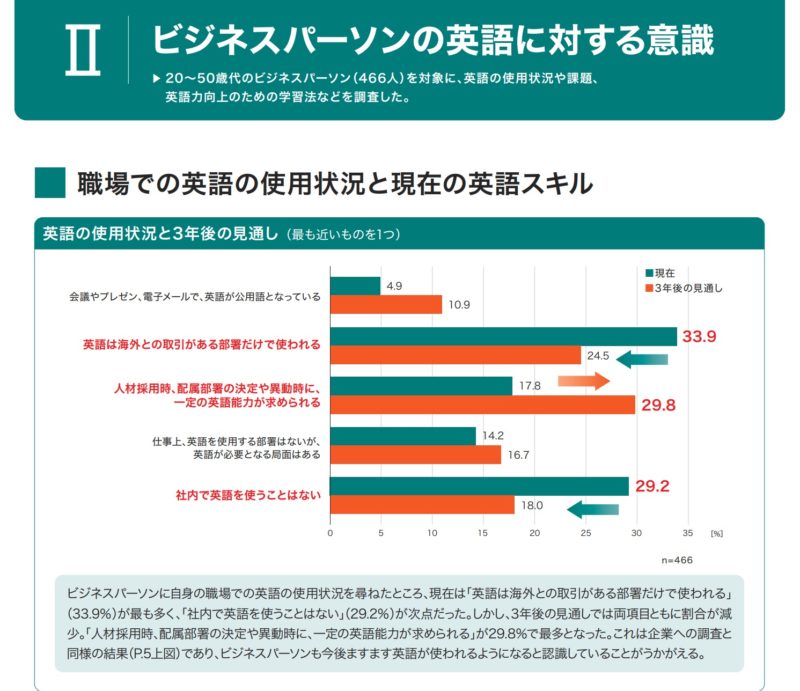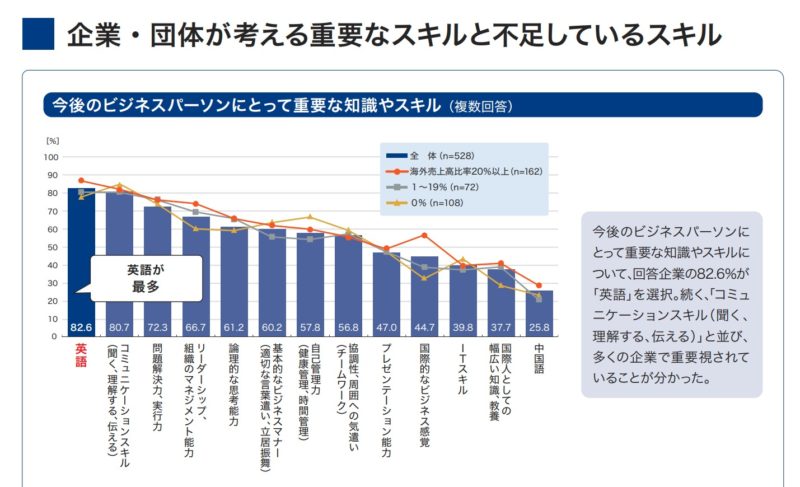Will non-Japanese speakers struggle working in Japan?
Japanese companies and languages other than Japanese
Are you looking for a Job in Japan that doesn’t require a high level of Japanese? Or are you bilingual (Japanese and English) and thinking of working at a company that emphasizes hiring native English speakers? In Japan, there are companies that do not require much Japanese and jobs that absolutely require to speak fluent Japaense, and not so much for other languages.
In this article, we will look into the demand for language skills in Japanese companies and how you can find the best place to work at.
The percentage of English in Japanese companies
According to an English usage survey 2019 (Companies and Organizations)IIBC (The Institute for International Business Communication) which also runs the TOEIC test, 29.2% of employees never use English in their daily work lives. When you look at the chart below, you can tell that this number is expected to decline to 18.0% in the next 3 years.
Another question where they asked if English proficiency will be required when hiring candidates, the percentage of people who answered yes was 17.8%. However, when asked about 3 years from now, the number increased to 29,8%. These answers indicate that not all positions require English proficiency, but will be increasingly important to find candidates that can understand English in the near future.

Demand for Bilinguals in Japanese companies
In Japan, there aren’t a lot of people who can speak more than one language. We have wrote an article about how bilinguals should hunt for jobs in Japan in this article. → Boston Career Forum is the best place for bilinguals to find a job in Japan
Here is a section from our previous article that explains the current situation of bilinguals in Japan.
In Japan, there is a great demand for Bilinguals. Particularly people who can speak Japanese and English fluently. In the entire world, it is said that about half of the population is bilingual. However, in Japan, that number dwindles down to only 10%. Compared to that to a country in the EU, you can see how low the percentage of Japan is. For example, the percentage of people who can speak another language other than their native language is 98% in Luxembourg, 95% in Latvia, and 94% in the Netherlands.
The graph below shows the skill that companies and organizations think that they lack but also think that is necessary. When you look at this graph, you can see that English is the number 1 skill that the company desperately needs. 82.6% of the companies answered that they need businessmen to be able to use English. This is an interesting fact, considering that communication ability (80.7%), and leadership (66.7%) are considered less important than English proficiency.

How can English speakers work in Japan?
Language support for non-Japanese speakers in Japanese companies
Languages support is important for those who aren’t fluent in Japanese because just that will make communicating with your peers and clients much tougher. Not just the language barrier but there is also the need to learn Japanese manners and cultural practices in order to conduct business in Japan. Usually, if it is a company that has a track record of hiring a lot of foreigners, they will typically have some sort of Japanese language support. However, in most cases, this isn’t enough.
Therefore, some companies will pay for you to attend a Japanese language school whether it’s online or offline. It might actually be better for you to check the company if they pay for language school because that will probably be better than any kind of internal language support system.
Companies that use English intensively in their work environment?
If you are not sure if you can communicate in Japanese fluently, there is no need to worry. You just have to find a job that doesn’t require you to speak Japanese. Typically this will be a specialist position, such as software engineer or a specialist of global financing. It would be smart for you to avoid getting a customer-facing job unless it is towards a global customer.
So, what types of companies use English intensively than other Japanese companies? Well, the quick answer is “foreign companies (外資)”. Usually, the internal tool would be in English, and internal documents will be written in English as well, so there will be plenty of opportunities for you to utilize your English abilities. However, you must keep in mind that every foreign company comes to Japan to sell their services or products to Japanese people or Japanese companies. Therefore, if you get a non-specialist role, such as sales or marketing, even positions such as product manager or business strategy will have a high chance to use Japanese as the main language.
Recently, there are Japanese companies such as Rakuten and Mercari, that are famous for using English intensively within the company although they are both Japanese companies. Rakuten announced in 2010, that they will make English their official language in the company, and caused a public stir in Japan. Some tech companies and startup companies have a lot of English speakers within the company so it may be a good idea to look into those companies when looking for a job.

Put your English skills to use in Japan!
Find the best place English speakers to work in Japan
In this article, we have covered the current situation of how Japanese companies are implementing language support and how they think about hiring candidates that can utilize English fluently. We have also covered what kind of companies hire candidates who can speak English intensively.
There are a lot of companies and positions in Japan, that still require you to be able to understand Japanese. However, it is expected that more and more companies are trying to hire English speakers, and the work environment will also be much more global and friendly to non-native Japanese speakers.












